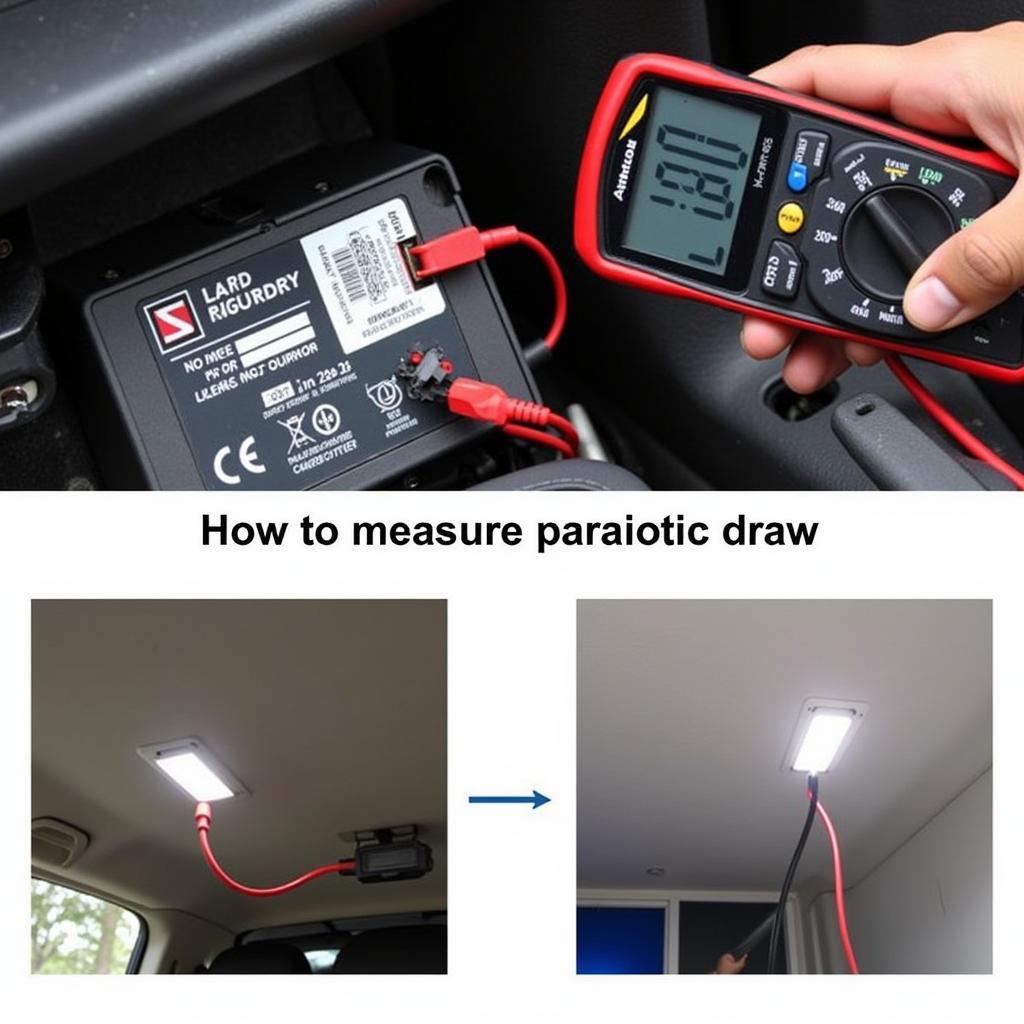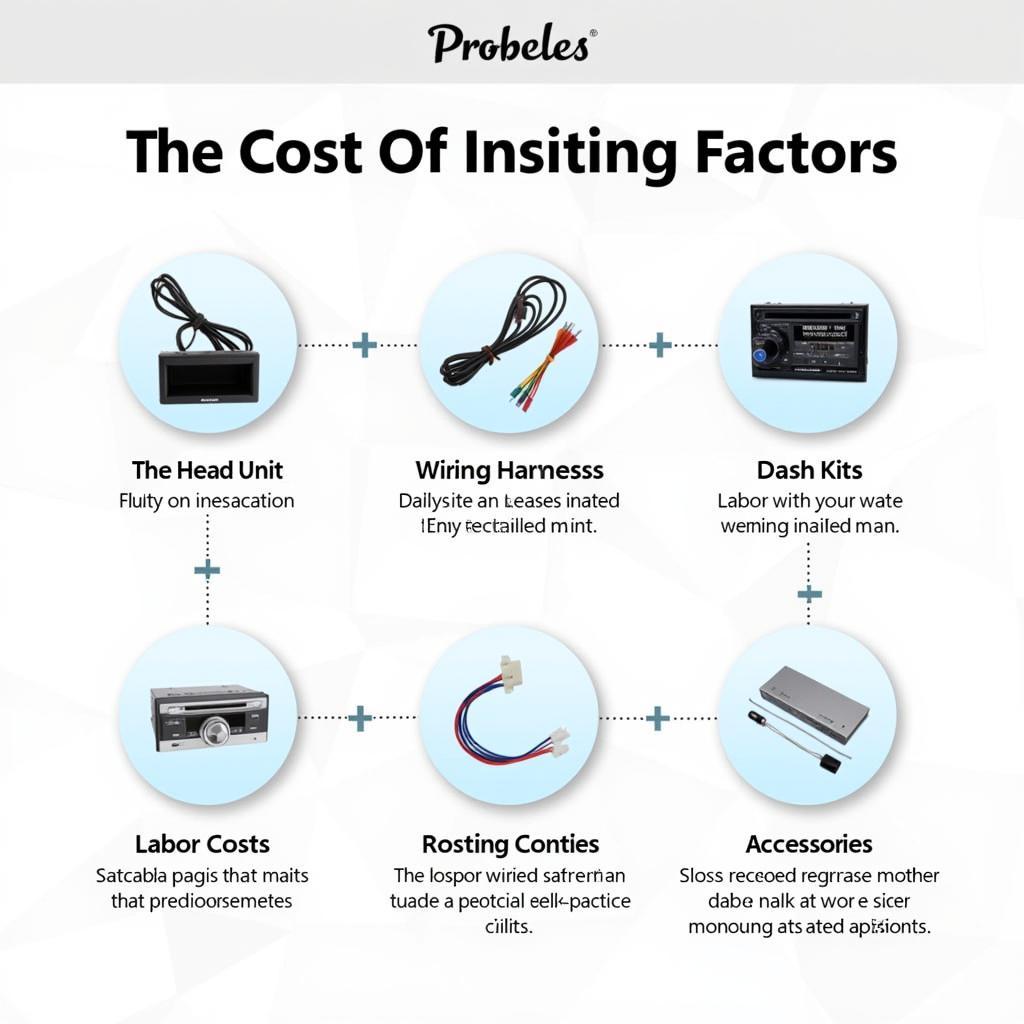A dead car battery is a frustrating experience. Understanding the causes of battery drain in car is crucial for preventing this inconvenience and ensuring your vehicle starts reliably. This article delves into the various reasons why your car battery might be draining, offering solutions and preventative measures to keep you on the road.
Common Causes of Battery Drain in Car
There are several reasons why your car battery might be losing its charge. Some are obvious, while others are more insidious and require a bit of detective work. Let’s explore the most common culprits behind battery drain in car.
Parasitic Draw: The Silent Killer
A parasitic draw occurs when an electrical component continues to consume power even when the car is off. This can range from a faulty interior light to a more complex issue with the car’s computer system. my car battery dies every few days This slow but steady drain can leave you with a dead battery overnight or within a few days.
 Example of Parasitic Draw
Example of Parasitic Draw
Faulty Alternator: Not Charging Properly
The alternator is responsible for recharging the battery while the engine is running. A malfunctioning alternator won’t adequately charge the battery, leading to a gradual depletion of power. Eventually, the battery won’t have enough juice to start the car.
What are the signs of a bad alternator?
- Dimming headlights
- Flickering dashboard lights
- Strange noises from the engine compartment
- Battery warning light illuminated
Extreme Temperatures: Affecting Battery Performance
Extreme temperatures, both hot and cold, can significantly impact battery performance. In cold weather, the chemical reactions inside the battery slow down, reducing its capacity. Conversely, excessive heat can accelerate the evaporation of battery fluid, leading to premature failure.
Old Age: The Inevitable Decline
Like any other component, car batteries have a limited lifespan. Over time, the battery’s ability to hold a charge diminishes, eventually leading to failure. The typical lifespan of a car battery is three to five years, although various factors can influence this.
How to Diagnose and Fix Battery Drain
Identifying the cause of your battery drain requires a systematic approach. Here are some steps you can take:
- Visual Inspection: Check for obvious issues like interior lights left on or corroded battery terminals.
- Parasitic Draw Test: Use a multimeter to measure the current draw with the car off. parasitic battery drain mini cooper This will help identify if there’s a parasitic drain.
- Alternator Test: Have the alternator tested to ensure it’s charging correctly. new battery new alternator still wont start This can often be done at an auto parts store.
- Battery Test: Have the battery tested to determine its health and capacity.
Expert Advice from John Smith, Automotive Electrical Engineer
“A simple parasitic draw test can save you a lot of headache down the road. It’s a quick and easy way to identify hidden electrical issues that are slowly draining your battery.”
Preventing Battery Drain in Car
Preventing battery drain involves regular maintenance and adopting good practices.
- Regularly clean the battery terminals: Corrosion can interfere with the electrical connection.
- Turn off all accessories: Ensure all lights, radio, and other accessories are off before exiting the vehicle. mini cooper battery replacement problems
- Limit short trips: Short trips don’t give the alternator enough time to fully recharge the battery.
- Park in a garage when possible: This helps protect the battery from extreme temperatures.
- Have your battery tested regularly: This can help identify potential problems before they become major issues. mini cooper battery drain problem
Expert Advice from Jane Doe, Certified Automotive Technician
“Regular battery maintenance is often overlooked but is crucial for prolonging battery life and preventing unexpected breakdowns. A simple cleaning of the terminals can make a big difference.”
Conclusion
Understanding the causes of battery drain in car empowers you to take preventative measures and address issues promptly. By following the tips and advice in this guide, you can avoid the frustration of a dead battery and ensure your car starts reliably every time.
FAQ
- How long should a car battery last? Typically, a car battery lasts three to five years.
- What are the signs of a dying battery? Slow engine cranking, dimming lights, and clicking sounds when turning the key are common signs.
- Can I jump-start a car with a completely dead battery? It might be possible, but if the battery is completely dead, it likely needs replacement.
- How can I test my car battery? You can use a multimeter or have it tested at an auto parts store.
- What is a parasitic draw? A parasitic draw is a constant drain on the battery even when the car is off.
- How do I fix a parasitic draw? Identifying and disconnecting the faulty component causing the draw is necessary.
- How often should I have my battery tested? It’s recommended to have your battery tested at least once a year or more frequently if you live in an area with extreme temperatures.


